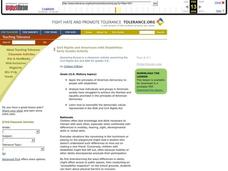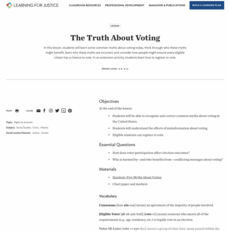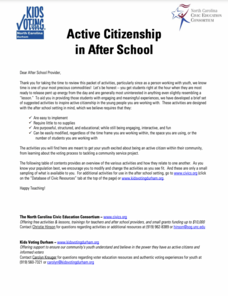Curated OER
ANTICIPATORY SET
Learners are be able to analyze primary sources (photographs and speeches) and write a definition of American Democracy. They are shown a photograph of Martin Luther King Jr. by Ben Fernandez, students are asked what is happening in the...
Museum of Tolerance
The Role of Citizens in a Participatory Democracy
Groups research participatory democracies and compare the role and rights of citizens in ancient history with those in recent U.S. history. Guided by a series of questions, individuals compose a persuasive essay in which they discuss the...
Museum of Tolerance
Citizenship Then and Now: Comparing Ancient Rome and Contemporary American Society
Class members research citizenship in Ancient Rome and in the United States and use the provided graphic organizers to compare the rights and responsibilities of citizens in these two democracies.
National Endowment for the Humanities
The Tyranny of the Majority
In American democracy, majority rules but what prevents the voices of the few from being crushed? Using excerpts from Alexis de Tocqueville's writings, young historians explore cases where minority rights were trampled upon. Extension...
North Carolina Consortium for Middle East Studies
Missing Pieces of the Puzzle: African Americans in Revolutionary Times
What's missing from most studies of the American Revolutionary War is information about the role African Americans played in the conflict. To correct this oversight, middle schoolers research groups like the Black Loyalists and Black...
Annenberg Foundation
The New Nation
The conclusion of the American Revolution brought about a new conflict—choosing the stye of government for the newly formed United States. Using the views of both Federalists and Anti-Federalists, learners work in pairs and groups to...
Center for History Education
The Founding Fathers and the Constitutional Struggle Over Centralized Power
Believe it or not, the Constitution was America's second attempt at a democratic government. Academics travel back to the past to explore the shortcomings of the Articles of Confederation that would eventually lead to the Constitutional...
Curated OER
Liberty and Democracy for All?
Learners consider what they already know about democracy and examine how viable democracy is for Middle Eastern nations such as Egypt and Saudi Arabia.
Curated OER
Civil Rights and Americans with Disabilities
Students apply the principles of American democracy to people with disabilities. They analyze how individuals and groups in American society have struggled to achieve the liberties and equality promised in the principles of American...
Museum of the American Revolution
Dissecting the Declaration
Delve into the past to understand the issues that led to the Declaration of Independence. Academics read excerpts from the Declaration of Independence and take a virtual tour of the American Revolution Museum. The resource explains how...
Curated OER
The Republic; Roman History, Democracy
Learners explain the ways in which current American system of government both resembles and differs from the system of government in Rome form about 510 to 264 B.C.
Curated OER
What's in a Name? The Use of Native American Images in Sports
Young scholars discuss and analyze the pros and cons of using Native American names and images to represent sports teams. Using primary sources, including position statements from Native American tribes, interviews with school alumni and...
A&E Television
Documenting Democracy: Lesson Plans on the United States Constitution
Balance and compromise. Class members come to understand the importance of these concepts as they investigate the concerns of the various stakeholders and how the format of the Constitution addressed these concerns.
PBS
Democracy in Action: Freedom Riders
This is a must-have resource for every social studies teacher covering the civil rights movement. Through an engaging video and detailed viewing guide, young historians learn about the Freedom Riders, and discover how everyday...
Curated OER
Defined: The Different Types of Government
The world is a big place, so it only stands to reason that different forms of government exist. Democracy, autocracy, oligarch, monarch, and dictatorship are all defined. An extensive explanation of US government system is also included....
Curated OER
Preserving Democracy
Students read excerpts of the Declaration of Independence and United States Constitution. Using the documents, they identify the ideas of how the government should be run. In groups, they develop a skit that encourages people to be...
DocsTeach
Memorializing Abraham Lincoln in Washington, DC
The legacy of President Lincoln continues to endure. Scholars view images of three statues that have been created to honor President Lincoln. Academics analyze the three images and share their findings in a group discussion format. Young...
Our White House
The Our White House Inauguration Celebration Kit for Kids!
Get the youngest American citizens involved in the presidential election and inauguration with a set of social studies activities. Focusing on the history of presidential inauguration ceremonies, learners draft their own poems, design...
Curated OER
Respect and Democracy
Students explore the concept of respect. In this respect and democracy lesson, students define respect and brainstorm examples of showing respect and disrespect. Students read Core Values of American Constitutional Democracy and pick out...
Teaching Tolerance
The Truth About Voting
True or False: Only Presidential elections matter. Academics delve into common voting myths to understand what is true and why the election process is critical to democracy. The lesson uses group discussion, activities, and handouts to...
Carolina K-12
Active Citizenship in After School
Active citizenship is the bedrock of any great democracy. Continue the trend by teaching the next generation about voting rights and the functions of elections in society. The variety of activities in the resource includes a human...
Teaching Tolerance
The True History of Voting Rights
Explore what voting rights really are in an intriguing instructional activity that explores the history of American voting. The resource examines the timeline of voting rights in the United States with group discussions,...
DocsTeach
Political Cartoon Analysis: No Taxation Without Representation
Delve into the world of political cartoons in a lesson on the American Revolution. Scholars practice analyzing an original political cartoon, answer questions, and participate in group discussion. Young academics gain an understanding of...
Benjamin Franklin Tercentenary
Benjamin Franklin, Elder Statesman
Ben Franklin was the only American to sign The Declaration of Independence, the Treaty of Alliance with France, the Treaty of Paris, and the US Constitution. An interesting resource explores his role in the latter by comparing the US...
Other popular searches
- Roots of American Democracy
- Basis of American Democracy
- Origins American Democracy
- Early American Democracy
- Native American Democracy
- Analyze American Democracy

























